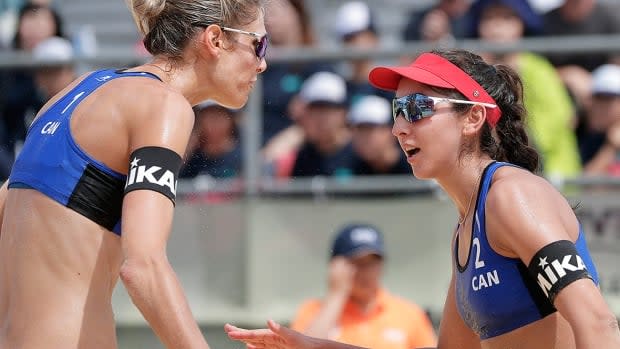World champions Pavan, Humana-Paredes 'finding ways to win' ahead of Tokyo

With just three months to go until Tokyo 2020, reigning beach volleyball world champions Sarah Pavan and Melissa Humana-Paredes are getting an Olympic preview in Cancun.
The Canadians flew to Mexico for the three-tournament event starting April 16 and ending May 2.
Pavan, 34, and Humana-Paredes, 28, finished with silver in the first tournament and ninth in the second.
"We're making adjustments," Pavan, born in Kitchener-Waterloo, Ont., told CBC Sports. "We're obviously not playing at the level that hopefully we will be in July.
"This is definitely going to continue to be an upward slope."
One of few competitions during pandemic
The Cancun event is one of the few tournaments Pavan and Humana-Paredes have competed in since the pandemic hit.
The duo had its first post-quarantine event in July 2020 at the AVP Champions Cup after spending 10 months away from competition. They won a bronze and two silvers, only to enter into another extended hiatus.

A semblance of a regular competition schedule started in March with the 2021 AVP World Tour. Pavan and Humana-Paredes won a silver in Doha, Qatar before coming to Cancun.
Although the pandemic hit each country differently, the pair says it doesn't see that disparity showing up on the courts.
"You can see some teams that have improved tremendously during the pandemic," Pavan said. "Some teams are taking a while to find their rhythm and get into it. But overall, I would say the level is pretty good.
"It's just a matter of who shows up at any given match or moment."
WATCH | Canada's world champion beach volleyball team gear up for Tokyo:
Information gathering for Olympics
During the pandemic, Pavan, Humana-Paredes and their team opted for a different tactic than a lot of their competition, focusing on strength and conditioning instead of on-court training.
The team is still getting back in the groove of competition, and they have that privilege since they locked in their Olympic qualification spot in 2019 after winning their world title.
"We're able to use each tournament to gather information and see how different teams are going to try to attack us and exploit our play, so that when we do get to Tokyo we are aware and prepared for that," Pavan said.
"We're finding ways to win, which is always important."
The weather is another thing. The conditions in Cancun have been challenging and Toronto-native Humana-Paredes expects the same in Tokyo.
"In terms of the humidity and the heat and even the wind, a lot of teams have had to change their style of game," she said. "We've had to make some big adjustments as well.
"I think that's been really great practise and it's a good opportunity to take these conditions and help prepare us better for Tokyo."
WATCH | Pavan, Humana-Paredes prevail against fellow Canadians in Cancun:
COVID-19 outbreak among volunteers
Another potential, albeit unwelcomed, Olympic-prep point is COVID-19. There's been an outbreak among the volunteers, so they've all had to drop their jobs to quarantine.
"There aren't any ball people on the courts anymore, there's no one keeping the big score boards," Pavan said. "So now we're required to go get the balls now to serve, which has slowed the pace of the game down and in his heat, is not bad."
It's getting used to unforeseeable curveballs like that which make these tournaments priceless, regardless of athletes placement or performance.
"I think [in] this series of events in particular, we're making less errors than everybody else," Pavan said. "Like we said, while we're not necessarily perfect, we're keeping the ball in play a lot of the time which is better than not.
"Moving into Tokyo, if this happens, we know we can rely on that and our consistency to take us where we need to go."

 Yahoo Sports
Yahoo Sports 